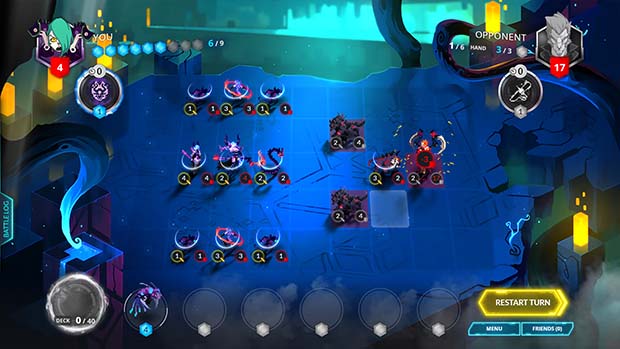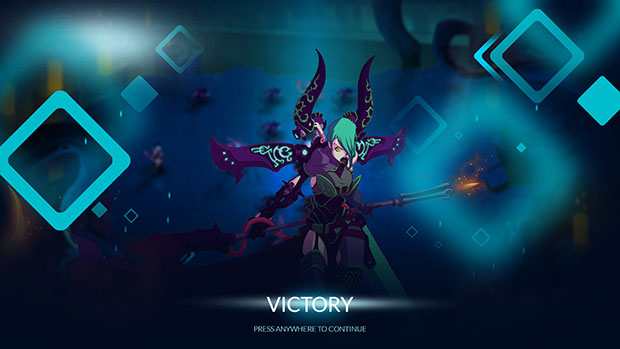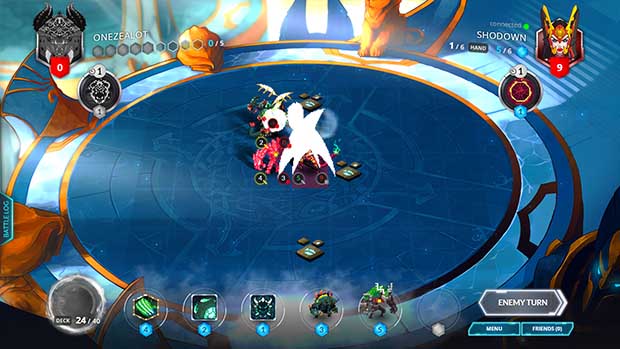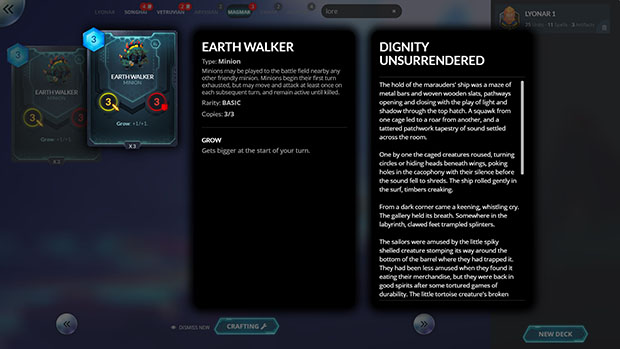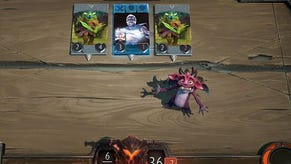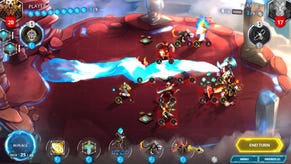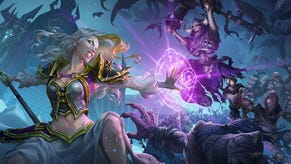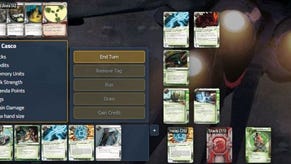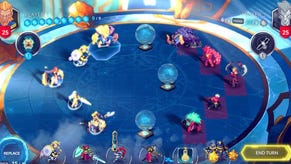Why Duelyst's Developers Think Going Free-To-Play Was The Right Move
The Benefits of F2P
Despite a growing wealth of awesome free-to-play games, the term itself remains a dirty word for a lot of people. But free-to-play isn't as black and white as some would like to believe. We've all paid top dollar for a game only to feel disappointed, and likewise, free-to-play doesn't have to mean being drip-fed bits of game in between rigorous bouts of patting you down to find where your wallet is. And that's exactly what Keith Lee and Emil Anticevic, head honchos over at Counterplay Games, the developer of Duelyst [official site], have been trying to prove.
If you're not familiar, Duelyst is a collectible card game with a tile-based strategic twist. Instead of just laying cards out and doing battle like in Hearthstone, they come to life as minions that take turns moving around a grid as you try to out maneuver your opponent. Duelyst was Kickstarted back in March of 2014 to the tune of over $137,000 dollars (about £90,000), and it banked heavily on the idea of being a hyper-competitive strategy game that would forego the trappings of the popular free-to-play model.
Until it didn't.
Back in February of 2015, Lee and Anticevic made the call to make Duelyst a free-to-play game, citing that their plans just couldn't be fully realized otherwise. Now, over a year later, Duelyst has had the tough job of dismantling all of those nasty preconceptions. But, according to Lee, Duelyst is a far better game than it ever could have been.
"When Emil and I originally first started, we were thinking of making a very compact game with a very small subset of cards," Lee explains. "We had at maybe two factions and maybe 40 cards. But when we started to build the game and the technology, the realization came through that we could release this very small game, but we couldn't realistically add more factions or more cards."
The more time Lee and Anticevic spent developing Duelyst, the more they started to realize the potential for what the game could be. Instead of just a tactically deep strategy game that would eventually lose its appeal because its financial model wasn't sustainable, Lee and Anticevic wanted to create a platform that they could continue to chip away at the unique intersection between card games and turn-based strategy that Duelyst represented.
While there always was the option for continuing down the path they were on and trying to expand on Duelyst through paid expansions, both felt like, for a first-time venture, the odds just weren't in their favor. For one, Anticevic was worried that the time between expansions would lead to a "ghost town effect," where players would leave the game until the next big update arrived. In a competitive game that lives and dies by the size of its audience, it could create a vicious cycle where players wouldn't play because there was nothing new, making it harder to find matches for the rest of the players who would, in turn, also leave. "It just wouldn't work," Lee argues.
"It was a tough decision," Anticevic adds.
Obviously, when the decision was made, some fans weren't at all enthused. The Kickstarter comments section quickly filled up with those expressing their distaste, especially because Lee and Anticevic had been so forward about why Duelyst wasn't built for free-to-play in the first place. Now, over a year later, that one decision still casts a shadow over Duelyst — if only a small one - but when I bring it up, Anticevic doesn't resent it.
"It's fair, right? We presented our vision and our credibility was on the line, and then we changed that vision, so obviously a lot of people felt that our credibility was eroded," he says. "We've spent a year building something to restore that credibility. It's frustrating to see people leave negative comments, but at the same time, we understand the reason."
Perhaps what's worse is, according to Lee, the way that negative response has propagated to become bigger than it ever should have been. "There's always going to be that vocal minority who is amplified," he says. "But the reality is that number of people is actually quite small. We immediately said that we would refund the people that were dissatisfied, and it ended up being less than 3% of all our backers. It's just the reality of internet comments and forums; you see these comments that are there forever, and people are like 'oh my gosh, this is super bad,' when it isn't at all the case."
I can't help but feel like I touched a nerve with Lee when I bring it up. He sounds weary. But if anything, the story of Duelyst's development highlights the awkward tension of trying to contain the fluid nature of game development inside of Kickstarter's box. Games change over the course of their development, sometimes for the better and other times for worse, but there's always an expectation that developers need to stick to that original pitch.
Eventually conversation begins to shift to the present, and Lee's tone picks back up. Though it had been in an open beta for months beforehand, Duelyst officially launched in April of this year, and both Lee and Anticevic couldn't be more excited.
"We've been really happy with the growth of Duelyst," Lee says. "We have about 100,000 games that are played per day. And for us, it's not so much about a single launch, our vision for Duelyst is to create a living game, and create interesting content week to week for players. The launch is just the beginning of what we'd like to build."
And that's where free-to-play comes back into the picture. Right now, Duelyst has six factions and over 400 cards, and that number is growing on a monthly basis. It feels far more active than, say, Hearthstone with its expansions and adventures that come months apart.
While the obvious benefit is that Duelyst is reaching a much wider audience and likely making a shiny dollar to boot, Lee is adamant that Duelyst isn't just falling in line with the wealth of other free-to-play card games. "What we're trying to do is offer players the most value as early as possible," he says.
Anticevic is a bit more on the nose: "In terms of free-to-play, our game is purely better because it's more generous."
And while bold, he isn't necessarily wrong. When Marsh Davies looked at Duelyst last year, he noted that the economy seemed to be far less aggressive than its peers. And after spending the last month trying Duelyst out for myself, I have to agree.
For one, the amount of gold you can earn in a day is notably higher than in other card games like Hearthstone. It's pretty typical to earn a new booster pack of five cards every single day. Lee is also quick to tout the generous drop rates, citing that legendary cards (the rarest in the game) tend to appear in about one of every four booster packs. "Most other games would be maybe around 1 in 20 to get a legendary," Lee says.
But it is worth noting that, while those numbers sound great on paper, what defines a legendary rarity card is mostly semantics. Just because something is rare doesn't mean it's necessarily good. It's also worth mentioning that Duelyst has a really high amount of legendary cards. Right now there's more legendary cards than there are epic or rare, the two next lowest rarities. Regardless, my own experience is that Duelyst is definitely one of the more generous digital card games you can play just by virtue of the rate in which I was opening packs.
"Our aim isn't to make a significant amount of money per user," Anticevic says, "It's just that we win when people play. We win when the game grows."
Lee expands on that by saying: "The reason people have this adversity to free-to-play is because the actual game that you're playing tends to be highly repetitive. The complexity and the area that developers optimize for is not the game itself, but the economy — like how you earn rewards in terms of the progression. Our objective has never been around the rewards, it's just about the intrinsic entertainment value of playing each match. We want people to play another match not because of the rewards, but because they're having fun."
Like he said earlier, Duelyst's jump to the free-to-play side of the fence was always about having an opportunity to expand upon that core concept and take it to new places. So how is Duelyst planning to do that?
For one, Duelyst is updated monthly with new features and balance updates in addition to special events that take place in the middle of the month like the most recent Seven Sisters update, which introduced seven new legendary cards for each faction (one is neutral) that players can earn by collecting all of the rare quality cards for that faction.
New "lore cards" have also been added, which take existing cards and add paragraphs of flavor text for those who want to dig into Duelyst's deep backstory. Eventually, every card will have a lore card associated with it. "We love the introduction of lore," Lee says. "In other card games, lore is a bit more of an afterthought, there's not a lot of connection between all the cards and how they tie together from that perspective."
I've been playing for just over a month now, and I can say that these kind of rapid fire updates do give Duelyst a distinct feeling of constantly evolving. There are always new cards to look forward to and tournaments seem to be happening weekly. But while I think all that might be cool, I could also understand how someone who was invested in the idea of Duelyst being a buy-to-play game wouldn't be convinced that they should now spend the time grinding out card drops (no matter how fast they may come). When I ask about bigger features, there's a lot of enthusiasm for the future but, sadly, not too much concrete to share.
"Joint social play is something that's really important to us," says Anticevic. He goes on to explain that, right now, a big focus is on finding ways to get people to play together that aren't inherently competitive. The specifics are fuzzy, and Anticevic is quick with phrases like "asynchronous single player," "cooperative modes," and he even suggests there could be modes where individual players contribute to an overarching goal. He also brings up some other key areas Duelyst is looking to improve upon, like its already impressive replay system that algorithmically sorts out highly competitive games to watch. But again, all of it seems a little too non-specific at this point to be really exciting. But all that said, without going to free-to-play the Duelyst we have today and in the future would definitely be a different beast.
Still, Duelyst is just now beginning to find its legs in a post-release world, and while I'm enjoying the hell out of it, I'm a wee bit skeptical of its future. I sympathize with Lee and Anticevic wanting to make Duelyst the best game it can be, but there's no denying they've put themselves in a tough position. Even if it was only a small minority of the backers who wanted refunds after the switch to free-to-play, as Lee says, I can't shake the feeling that his and Anticevic's ambitions are now going to be scrutinized closer than ever before.
"We accept the ambition is much higher," Anticevic says. "We now have to live by that and deliver on it. It would've been so sad if we had just shipped Duelyst and moved onto the next game. We feel like there's so many more things we can do here, so many cool features we can expand on. Just getting to this point we are today has been so challenging for a small team, so it would be sad to just say we're done, it's finished, go buy the DLC in a year."
Duelyst is available now for Windows and Mac.



